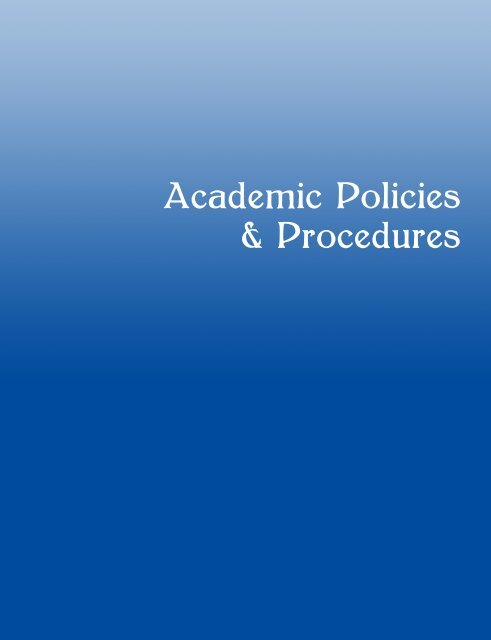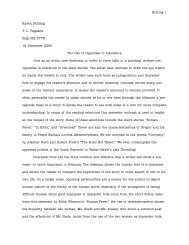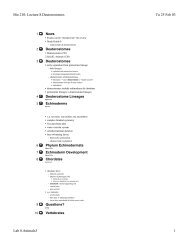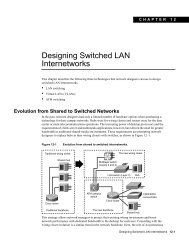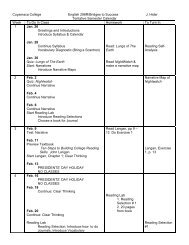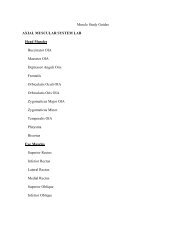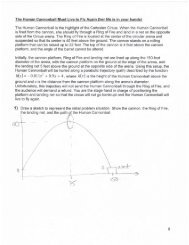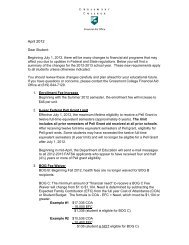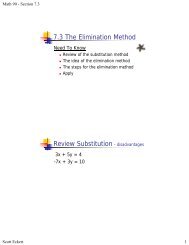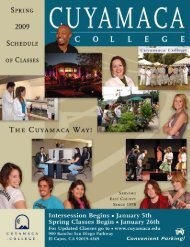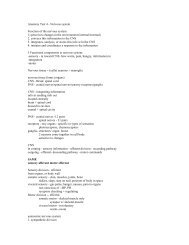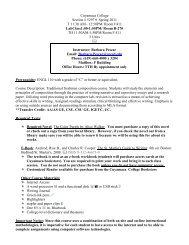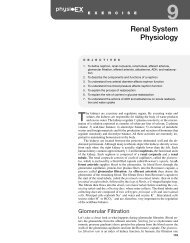Academic Policies & Procedures - Cuyamaca College
Academic Policies & Procedures - Cuyamaca College
Academic Policies & Procedures - Cuyamaca College
- No tags were found...
You also want an ePaper? Increase the reach of your titles
YUMPU automatically turns print PDFs into web optimized ePapers that Google loves.
<strong>Academic</strong> <strong>Policies</strong>& <strong>Procedures</strong>
<strong>Academic</strong> <strong>Policies</strong> and <strong>Procedures</strong> 31If a student enrolled in an “openentry/open exit” course is assigned anIP at the end of an attendance periodand does not re-enroll in that courseduring the subsequent attendanceperiod, the instructor will assign a gradeto be recorded on the student'spermanent record for the course.RD Report Delayed - The RD symbol maybe assigned by the Admissions andRecords Office only. It is to be usedwhen there is a delay in reporting thegrade of a student due tocircumstances beyond the control of thestudent. It is a temporary notation to bereplaced by a permanent symbol assoon as possible. “RD” is not used incalculating GPA.P, NP, W, MW, I, IP and RD grades are not usedin computation of grade point average but theW, NP and I are used for purposes of progressalert and disqualification status.GRADE POINT AVERAGE<strong>Academic</strong> achievement is reported in terms ofgrade point average (GPA). This is derived fromthe following weighting system:A+ 4.0 grade points per unit earnedA4.0 grade points per unit earnedA- 3.7 grade points per unit earnedB+ 3.3 grade points per unit earnedB3.0 grade points per unit earnedB- 2.7 grade points per unit earnedC+ 2.3 grade points per unit earnedCD2.0 grade points per unit earned1.0 grade points per unit earnedF 0.0 grade points per unit attemptedGrade point average is computed by dividingtotal units attempted into total grade pointsearned. Decisions on probation anddisqualification, scholarship, eligibility forgraduation, and transfer are all influenced ordetermined by grade point average; hence,students should pay constant attention to theirown grade point standing.GRADUATIONCEREMONYThe <strong>Cuyamaca</strong> <strong>College</strong> Commencementceremony is held each May or June,recognizing those students who have receivedtheir Associate Degrees and/or Certificates ofAchievement the previous summer, fall andcurrent spring semester. Information regardingthe commencement ceremony is available inthe Student Affairs Office. Students wishing toapply to receive a degree or certificate must filea Petition for Graduation in the Admissions andRecords Office. Deadlines are printed in thecatalog and class schedule.GRADUATION WITHHONORSStudents who have earned a 3.5 or better GPAin all college work attempted graduate withhonors.Official transcripts from all colleges attendedmust be on file in the Admissions and RecordsOffice. However, if no course work on atranscript from another college is used to meetany degree requirement, students may excludethat entire transcript from being used tocompute their overall GPA for graduation.Students electing this option need to make thisrequest at the time they file an Evaluation forGraduation Request form in the Admissionsand Records Office. An official transcript mustbe on file prior to request for exclusion. Thisoption only applies to the GPA used todetermine graduation with honors from<strong>Cuyamaca</strong> <strong>College</strong>. It will not affect transferGPA and other colleges and universities maynot calculate GPA for honors status the sameway.HONORSStudents carrying 12 or more units at<strong>Cuyamaca</strong> <strong>College</strong> in which letter grades areearned (“Pass” grades not included), whomaintain a 4.0 GPA during any semester, areplaced on the President’s List. Students whomaintain a 3.5 or better GPA during anysemester are placed on the Dean’s List.Students carrying less than 12 units at either<strong>Cuyamaca</strong> <strong>College</strong> or Grossmont <strong>College</strong>, butcarrying 12 or more units in which letter gradesare earned (“Pass” grades not included) at<strong>Cuyamaca</strong> and Grossmont <strong>College</strong>s, whomaintain a 4.0 GPA during any semester, areplaced on the District President’s List. Studentswho maintain a 3.5 or better GPA during anysemester are placed on the District Dean’s List.Part-time students are eligible for the Dean’sList if they (1) complete 12 units at <strong>Cuyamaca</strong><strong>College</strong> in one academic year (July 1 throughJune 30) with a GPA of 3.5 or better (“Pass”grades not included) and (2) were enrolled infewer than 12 units per semester.MATRICULATIONAPPEALSINFORMATIONPARTICIPATION IN MATRICULATIONSERVICESAll students are encouraged to participate inMatriculation services which includeassessment, orientation, counseling andadvisement; however, if a student does not wishto take part in any or all of these services, thestudent shall meet with a counselor to discussNon-Participation in Matriculation Services.COMPLAINT OF UNLAWFULDISCRIMINATIONIf a student feels that assessment, orientation,counseling, prerequisites or any otherMatriculation procedure is being applied in adiscriminatory manner, a process has beenestablished to achieve a satisfactory resolutionof the problem. This process includes:Level 1Level 2Meet with the Chairperson ofCounseling (or designee) to discussthe situation and seek solutions to theproblem within three working days. Arecord of the discussion and thesolution is filed at this time.In the event a student complaint isnot resolved at Level 1, theChairperson of Counseling (ordesignee) will refer the student to theDean of Counseling and EnrollmentServices. The Dean will discuss thecomplaint with the student and, ifnecessary, assist the student inpreparing a written complaint to theAppeal Panel. An Appeal Panelcomposed of the Vice President ofStudent Services, a counselor, theGender Equity Coordinator, onestudent and one instructional facultymember will review the complaint andrespond appropriately within 10working days.NOTICE: If the above procedure is followed andthe student is not satisfied, and the complaint ispredicated on an alleged unlawfuldiscrimination on the basis of ethnic groupidentification, religion, age, gender, color, orphysical or mental disability, and this complaintis not resolved to his/her satisfaction within 30days of its filing, the student may file a formalcomplaint. If the student is interested inpursuing this option, please contact:Tim CorcoranDirector of Employee and Labor RelationsGrossmont-<strong>Cuyamaca</strong> Community <strong>College</strong> District8800 Grossmont <strong>College</strong> DriveEl Cajon, CA 92020MINIMUM LOADREQUIREMENTS<strong>Cuyamaca</strong> <strong>College</strong> does not specify a minimumload except when the student desires to meetcertain requirements such as:1. Certification to the Department of Health,Education and Welfare that the student isattending full-time. Requirement: 12 or moreunits a semester, but a student shouldaverage 30 units a year.2. Veteran Affairs certification for Chapters 30,31, 32, 33, 35 and 1606.Fall or Spring SemesterFull-time . . . . . . . . . . . .12 unitsThree-quarter time . . . .9-11 1 /2 unitsOne-half time . . . . . . . .6-8 1 /2 unitsOne-quarter time . . . . .3-5 1 /2 unitsSummer SessionCalculated on an individual class basis.Contact the Veterans Specialist in theAdmissions and Records Office for detailedinformation.3. International students with an “F-1” visaissued by <strong>Cuyamaca</strong> <strong>College</strong>. Requirement:12 or more units a semester.4. Enrollment verifications for insurancebenefits that a student is attending full-time.Requirement: 12 or more units a semester or5 or more units for summer session.5. Athletics - Eligibility to participate in PacificCoast Conference intercollegiate athletics.Requirement: 12 or more units in courses forwhich NEW units of credit may be earned.Students should see Pacific CoastConference and <strong>Cuyamaca</strong> <strong>College</strong>regulations for additional requirements.6. Student Government - Eligibility toparticipate in student government as anoffice holder or in intercollegiate activitiesother than athletics. Requirement: 6 or moreunits during the semester of participation.
32<strong>Academic</strong> <strong>Policies</strong> and <strong>Procedures</strong>PASS/NO PASSGRADING OPTIONThe Pass/No Pass (P/NP) grading option isoffered so that students may explore subjectareas of interest outside those of their knownabilities or assumed competence withoutcompeting for grades with students who aremajoring in that subject. <strong>Cuyamaca</strong> <strong>College</strong>encourages this kind of exploration.In any course offered at <strong>Cuyamaca</strong> <strong>College</strong>, astudent may elect to be graded on a “P/NP”basis providing the course is not part of aDegree or Certificate of Achievement. In allcases, a student enrolled in a course must havemet course prerequisites.A maximum of 12 credit units earned at<strong>Cuyamaca</strong> <strong>College</strong> with “P” grades may becounted toward satisfaction of GeneralEducation and elective curriculum requirementsfor graduation. Grades received from otheraccredited institutions, as well as creditsauthorized for military courses and AdvancedPlacement examinations, may be applied as“P,” when appropriate, toward graduation.Some courses in the curriculum are offeredexclusively on a “P/NP” basis. Credit unitsearned in these courses are exempt from the12 unit restrictions. In all other courses that arenot part of a Degree or Certificate ofAchievement, the election to be graded on a“P/NP” basis is at the option of the student.Students electing to be graded on a “P/NP”basis shall establish that option in writing by theend of the fifth week of the semester. (Shorttermclasses will be allowed a proportionateamount of time.) Once the “P/NP” deadline haspassed, the decision is irrevocable.A “P” grade shall represent at least asatisfactory (“C” grade) level of performancebut shall not be counted as units attempted incomputing GPA.A “NP” grade indicates unsatisfactorycompletion of course requirements but will notbe counted as units attempted in computingGPA. “NP” grades will be taken intoconsideration in the determination oflack-of-progress probation and disqualificationstatus.Students intending to transfer to four-yearcolleges or universities should check thespecific policies of those institutions pertainingto transferability of “P” grades.POLICIES RELATINGTO STUDENTSPOLICY<strong>Academic</strong>Accommodations<strong>Academic</strong> AppealsAmericans withDisabilities Act (ADA)Bulletin BoardCampaign and ElectionWHERE TO FIND ITDisabled StudentsPrograms & ServicesDisabled StudentsPrograms & ServicesVice President,Student ServicesStudent AffairsASGCC OfficeStudent AffairsCompliance withDisabled StudentsStudents withPrograms & ServicesDisabilities RegulationsSection 504 of the 1973 Rehabilitation ActDistrict Drug andAlcoholDistrict Public SafetyHealth ServicesFamily Educational Admissions and RecordsRights and Privacy Act <strong>College</strong> CatalogMatriculation Planand Appeal ProcessDean of Counseling andEnrollment ServicesPetition to Challenge Counseling CenterCourse Prerequisites, <strong>College</strong> CatalogCorequisites and Limitations on EnrollmentSexual Harassment <strong>College</strong> CatalogDirector, Employee and Labor RelationsVice President, Student ServicesReference Copies: Student AffairsSmoke/TobaccoFree FacilityVice President,Administrative ServicesStudent Code of Conduct Student AffairsVice President, Student Services<strong>College</strong> CatalogStudent Grievance and Student AffairsDue Process <strong>Procedures</strong> <strong>College</strong> CatalogVice President, Student ServicesTitle IX ProhibitingSex Discriminationin EducationDean of Counseling andEnrollment ServicesPREREQUISITES,COREQUISITES,RECOMMENDEDPREPARATIONS, ANDLIMITATIONS ONENROLLMENTA prerequisite is a condition of enrollment that astudent is required to meet in order todemonstrate current readiness for enrollment ina course or educational program.A corequisite is a condition of enrollmentconsisting of a course that a student is requiredto simultaneously take in order to enroll inanother course.An advisory or recommended preparation is acondition of enrollment that a student isadvised, but not required, to meet before or inconjunction with enrollment in a course oreducational program.Limitations on enrollment are conditions forenrollment in Honors courses or courses whichinclude public performance or intercollegiatecompetition.All courses shall be open for enrollment to anystudent who has been admitted to the college,except that students may be required to meetnecessary and valid prerequisites. In addition,the District may also limit enrollment in a coursebased on health and safety considerations,facility limitations, or legal requirementsimposed by statute or regulations.GROUNDS FOR CHALLENGE ARE:1. Student can demonstrate that theprerequisite has not been establishedfollowing the District’s policy or inaccordance with Title 5.2. Student can demonstrate that the course isdiscriminatory or applied in a discriminatorymanner.3. Student can demonstrate knowledge or skillneeded to succeed in the course without theprerequisite.4. Student can demonstrate that attainment ofhis/her educational goal will be undulydelayed because the prerequisite has notbeen made reasonably available (impactedprograms).5. Student can demonstrate that no threat isposed to self or others in a course which hasa prerequisite established to protect healthand safety.Students should plan their schedules early andsee a counselor for assistance.CHALLENGE PROCEDUREStudents who believe that they have sufficientgrounds may challenge a prerequisite,corequisite, or limitation on enrollment. Astudent may obtain a Petition to ChallengePrerequisites, Corequisites, and Limitations onEnrollment as well as a copy of the challengeprocedure in the Counseling Center no laterthan 10 working days prior to the publishedadd deadline for the course being challenged.Students who challenge a prerequisite orcorequisite after the start of the semestershould speak with a counselor. Contact theCounseling Center for additional information.PROBATION ANDDISQUALIFICATION<strong>Cuyamaca</strong> <strong>College</strong> believes that students whocan profit from higher education should beallowed admission free of probationary status.Grades earned at other schools prior toadmission to <strong>Cuyamaca</strong> <strong>College</strong> shall not beconsidered in determining probationary status.PROBATION1. <strong>Academic</strong> Probation: Any student who hasattempted a minimum of 12 semester units atGrossmont-<strong>Cuyamaca</strong> Community <strong>College</strong>District (GCCCD) and whose cumulativecollege grade point average falls below a 2.0in courses receiving letter grades shall beplaced on academic probation.2. Lack-of-Progress Probation: Any student whohas enrolled in a total of at least 12 semesterunits (beginning with the Fall 1981 semester)at GCCCD shall be placed onlack-of-progress probation when thestudent’s cumulative units indicate 50percent or more units of “W,” “I”, “NC” or“NP.”3. Removal from Probation:a. Any student placed on academicprobation shall be removed fromprobation when the cumulative GPA atGCCCD has improved to 2.0.b. Any student placed on lack-of-progressprobation shall be removed fromprobation when the cumulative units of“W,” “I”, “NC” or “NP” recorded at GCCCDare less than 50 percent of the total unitsattempted.
<strong>Academic</strong> <strong>Policies</strong> and <strong>Procedures</strong> 33DISQUALIFICATIONAny student disqualified from a college withinthe Grossmont-<strong>Cuyamaca</strong> Community <strong>College</strong>District may not attend any college within theDistrict during the next consecutive semester.The student may, however, attend the summersession.1. <strong>Academic</strong> Disqualification: Any student onacademic probation whose semester GPAfalls below 2.0 shall be academicallydisqualified. Any student on academicprobation whose semester GPA equals orexceeds 2.0, but whose cumulative GPA forall units attempted remains below 2.0, shallbe continued on probation.2. Lack-of-Progress Disqualification: Anystudent who is on lack-of-progress probationand whose semester work indicates 50percent or more units of “W,” “I”, “NC” or“NP” will be disqualified. Any student onlack-of-progress probation whose semesterwork indicates fewer than 50 percent units of“W,” “I”, “NC” or “NP,” but whose cumulativerecords show 50 percent or more units of“W,” “I”, “NC” or “NP,” will be continued onlack-of-progress probation.REINSTATEMENTAny student believing to be unjustifiablydisqualified may file a petition with theAdmissions and Records Office requesting thatsuch disqualification be reconsidered. Studentsare encouraged to see a counselor forassistance with petitions. To facilitate the officialadding of courses prior to the published adddeadline, a petition for reinstatement should besubmitted no later than ten working days priorto the published add deadline.Any veteran who petitions for readmission tothe college following disqualification must meetwith a counselor and have the counselor makea recommendation on the petition prior to beingconsidered for readmission.REMEDIAL COURSELIMITStudents may not receive credit for more than30 units of remedial course work. This limit shallnot apply to the following students:• Students enrolled in one or more courses ofEnglish as a Second Language.• Students identified by a college in theDistrict as having a learning disability.Students may be granted a waiver to thelimitation upon petition to a college in theDistrict. Waivers will be granted only when thestudent shows significant and measurableprogress toward the development of skillsnecessary for college-level courses. Suchwaivers will be given only for a specified periodof time or for a specified number of units.REPETITION OFCOURSESA student is not obligated to repeat a coursewhich he/she has failed unless it is a courserequired for graduation, transfer or is aprerequisite to another required course.SUBSTANDARD WORK1. A student may repeat any course in which asubstandard final grade (“D,” “F”, “NC” or“NP”) was earned. If the course is offered atboth colleges in the District, the student mayrepeat the course at either college. A coursemay be repeated twice under this policy.2. Upon completion of a repeated course, theoriginal grade will be annotated and removedfrom the cumulative totals on the academictranscript in such a manner that all workremains legible, insuring a true and completeacademic history. Only the last grade will beincluded in determining GPA and academicstanding, and only those units will be countedtoward graduation. No assurance can beprovided that repeated course(s) will betreated in this manner by other institutions.SPECIAL CIRCUMSTANCESSPECIAL NEEDSSubject to the provisions above, additionalrepetitions of special specific classes arepermitted to provide accommodations to astudent's educational limitations pursuant tostate and federal nondiscrimination laws whensuch repetitions are essential to completing astudent's preparation for enrollment into otherregular or special classes.PASSED COURSEA student may not repeat a course in which agrade of “P” or “C” or higher was earnedexcept by petition under extenuatingcircumstances and must be needed to meet aneducational or occupational objective. Aminimum of two years since the completion ofthe course must have elapsed before a petitioncan be filed. If such circumstances do exist, thegrade earned in the repeated course shall notbe counted in calculating the student’s GPA.MANDATED TRAININGCourses that are required for mandated trainingare petitionable within the two-year time period.SEXUALHARASSMENTThe Grossmont-<strong>Cuyamaca</strong> Community <strong>College</strong>District is committed to providing an academicand work environment that respects the dignityof individuals and groups. As per Board Policy3430, the District shall be free of sexualharassment and all forms of sexual intimidationand exploitation. The District shall also be freeof unlawful harassment pertaining to: ethnicgroup identification, national origin, religion,age, sex (gender), race, color, medicalcondition, ancestry, sexual orientation, maritalstatus, physical or mental disability, or becausehe or she is perceived to have one or more ofthose characteristics. Harassment based onany of the protected status is prohibited and willnot be tolerated. It is illegal to retaliate againstany individual who filed a sexual harassmentcomplaint or for participating in a sexualharassment investigation. The District’s policy inits entirety may be found in the Student Affairsoffice or the District Employee and LaborRelations office.STUDENT CODE OFCONDUCTGROUNDS FOR DISCIPLINARY ACTIONStudent conduct must conform to District and<strong>College</strong> rules and regulations. If a StudentCode of Conduct violation occurs while astudent is enrolled in any program of instructionwithin the District, to include distanceprograms, he or she may be disciplined for oneor more of the following causes that must beDistrict related. These categories of behaviorare not intended to be an exhaustive list, butare examples of causes and are good andsufficient causes for discipline, including butnot limited to the removal, suspension orexpulsion of a student. Other misconduct notlisted may also result in discipline if good causeexists (Education Code Section 76034).• <strong>Academic</strong> dishonesty such as cheating orplagiarism, or knowingly furnishing falseinformation to the District and/or the <strong>College</strong>by any method including but not limited toany electronic mail, text messaging, media,or online course.• Forgery, alteration or misuse of District or<strong>College</strong> documents, records, oridentification.• Obstruction or disruption of instructional,counseling, administrative, public service orother authorized District or <strong>College</strong> functionsor activities.• Assault, battery, abuse, harassment or anythreat of force or violence or hazing directedtoward any person on District-owned orcontrolled property, or at District or <strong>College</strong>sponsoredor supervised functions, orconduct which threatens or endangers thehealth or safety of any such person, orstalking of any District or <strong>College</strong> student orstaff member by any method including butnot limited to any electronic mail, or othermedia.• Theft of or willful damage to District propertyor theft or willful damage to property of amember of the District or <strong>College</strong> community,such as visitors, students or employees onDistrict property or at an authorized Districtor <strong>College</strong> activity.• Unauthorized entry onto or use of District or<strong>College</strong> facilities including but not limited toadministrative offices and instructionalclassrooms.• Violation of District or <strong>College</strong> rules orregulations including District or <strong>College</strong>policies concerning student organizations,use of District or <strong>College</strong> facilities, or thetime, place, and manner of studentexpression (Education Code 76120).• Use, possession, or distribution of alcoholicbeverages, narcotics, or controlledsubstances, including related paraphernaliaon campus, except as expressly permittedby law, or presence on District property or ata District or <strong>College</strong> authorized event whileunder the influence thereof.• Willful failure to comply with directions ofDistrict or <strong>College</strong> officials, including facultyand staff acting in the performance of theirduties.• Disorderly, lewd, indecent, or obsceneconduct, expression, or language on Districtownedor controlled property, to include butnot limited to computers or servers, or atDistrict or <strong>College</strong>-sponsored or supervisedfunctions.
34<strong>Academic</strong> <strong>Policies</strong> and <strong>Procedures</strong>• Use of slander, libel or in any way across anymedium including electronic mail, textmessaging, web sites, or blogs to causedefamation.• Possession or use of explosives, dangerouschemicals, deadly weapons including butnot limited to knives, firearms, martial andphysical arts training or implements (notexpressly required for an academic or noncreditcourse of instruction), or any itemused to threaten bodily harm to any personon District property or at a District or <strong>College</strong>function without prior authorization of theChancellor or designee.• Misrepresentation of oneself or of anorganization to be an agent of the District or<strong>College</strong>.• Conduct that is in violation of Federal, State,or local laws or ordinances while on Districtpremises or at District or <strong>College</strong>-sponsoredor supervised activities.• Abuse of computer facilities, not limited tobut including servers, the Internet andtelephones or use of computers for otherthan authorized assigned work including, butnot limited to: unauthorized entry into a file toread, use, copy, or change its contents;unauthorized transfer of a file; unauthorizeduse of another individual’s identification orpassword; use of District or <strong>College</strong>computing facilities to interfere with the workof another member of the District or <strong>College</strong>community; use of computers forunauthorized activities; unauthorized use ofcomputers to display material of a sexualnature or other material that creates a hostileenvironment for persons in the immediatevicinity; and by any method including but notlimited to any electronic mail, media (BP/AP3720).• Attempting any of the causes for disciplinaryaction identified above.TYPES OF DISCIPLINARY ACTIONSDisciplinary actions that may be imposed forviolations of the Student Code of Conductinclude the following:• Warning: Written or oral notice to the studentthat continuation or repetition of misconductmay be cause for further disciplinary action.• Reprimand: Written censure for violation ofspecific regulations.• Disciplinary Probation: Specific period ofconditional participation in campus andacademic affairs that may involve exclusionfrom designated privileges or extracurricularactivities. If a student violates any conditionof probation, or is charged a second timewith a violation of the Standards of StudentConduct during the probationary period, itshall be grounds for revocation of thestudent’s probationary status and for furtherdisciplinary action to be taken in accordancewith these procedures.• Faculty-Initiated Suspensions: A facultymember may remove for good cause anystudent from his or her class for up to two (2)class sessions. The student shall not returnto the class during the period of the removalwithout concurrence of the instructor and, ifrequired, the consent of the Vice President ofStudent Services (VPSS) or designee.Nothing herein will prevent the <strong>College</strong>President, the VPSS, or designee fromrecommending further discipline inaccordance with these procedures based onthe facts that led to the removal. As used inthis rule, “good cause” includes thoseoffenses listed in the Student Code ofConduct. The faculty member shallimmediately report the suspension to therespective division administrator and to theVPSS or designee. If the student is a minor,the <strong>College</strong> President, the President’sdesignee or the VPSS shall schedule aconference with the student and thestudent’s parent or guardian regarding thesuspension. The faculty member is notobliged to provide makeup opportunities forclass work missed during the two (2) classperiods of suspension.• Suspension or Termination of FinancialAid: In the event a student is suspended forwillfully and knowingly disrupting the orderlyoperation of the campus, this action willresult in ineligibility for state financial aid, asdefined in Education Code Section 69813,for the period of suspension (EducationCode Section 69810).• Immediate Interim Suspension: The <strong>College</strong>President, the President’s designee or theVPSS may order immediate suspension of astudent when he or she concludes thatimmediate interim suspension is required toprotect lives or property and to ensure themaintenance of order provided that areasonable opportunity be afforded thesuspended person for a hearing within ten(10) days of the time that the VPSS ordesignee, or the <strong>College</strong> President becameaware of the infraction unless mutuallyagreed upon by the student and thedesignated <strong>College</strong> administrator that moretime is required.• In cases where an immediate interimsuspension has been ordered, the time limitscontained in these procedures shall notapply, and all hearing rights, including theright to a formal hearing where a long-termsuspension or expulsion is recommended,will be afforded to the student according tothe provisions above.• In the event that a student does not requesta hearing within the ten (10) days or contactthe VPSS or designee, or the <strong>College</strong>President to establish a mutually agreedupon time for a hearing, the college wherethe infraction occurred will proceed with adue process hearing twenty (20) days afterthe point that the aforementionedadministrators became aware of theinfraction with or without the accusedstudent being present. Students placed onImmediate Interim Suspension shall haveholds placed on all records and transcriptspending the outcome of the due processhearing (Education Code Section 66017).• Withdrawal of Consent to Remain onCampus: The <strong>College</strong> President, thePresident’s designee or the VPSS, may notifyany person as to whom there is a reasonablebelief that the person has willfully disruptedthe orderly operation of the campus thatconsent to remain on campus has beenwithdrawn. If the person is on campus at thetime, he or she must promptly leave or beescorted off campus by District PublicSafety. If consent is withdrawn by the<strong>College</strong> President, the President’s designeeor the VPSS, a written report must bepromptly made to the <strong>College</strong> President. Theperson from whom consent has beenwithdrawn may submit a written request for ahearing on the withdrawal within the periodof the withdrawal. The request shall begranted no later than seven (7) days from thedate of receipt of the request. The hearingwill be conducted in accordance withprovisions of this procedure relating tointerim suspensions. In no case shallconsent be withdrawn for longer thanfourteen (14) days from the date upon whichconsent was initially withdrawn. Any personas to whom consent to remain on campushas been withdrawn who knowingly reentersthe campus during the period in whichconsent has been withdrawn, except tocome for a meeting or hearing, is subject toarrest (California Penal Code 626.4).• Short-Term Suspension: Temporaryexclusion from student status or otherprivileges or activities for a specified periodof time not to exceed ten (10) days(Education Code Section 76031).• Long-term Suspension: Temporaryexclusion from student status or otherprivileges or activities for the remainder ofthe current semester.• Expulsion Subject to Reconsideration:Permanent termination of student status,subject to reconsideration by the Board ofTrustees after a specified length of time.Reconsideration may be requested inaccordance with the procedure forreconsideration.• Permanent Expulsion: Permanenttermination of student status. There shall beno right of reconsideration of a permanentexpulsion at any time. On its own motion, theBoard of Trustees may reconsider suchactions at any time.• Restitution: Appropriate restitution shall besought from any student found guilty oftheft, vandalism or willful destruction ofDistrict or <strong>College</strong> property.STUDENT GRIEVANCEAND DUE PROCESSPROCEDURESThe educational philosophy of the Grossmont-<strong>Cuyamaca</strong> Community <strong>College</strong> District set forthby Governing Board Policy 1300 states that“The <strong>College</strong>s recognize the worth of theindividual and the fact that individual needs,interests, and capacities vary greatly.” Withacceptance of this principle comes therecognition that divergent viewpoints may resultand that a process by which these viewpointscan be aired and resolved must be established.The purpose of these procedures is to providea prompt and equitable means for resolvingstudent grievances. In the pursuit of academicgoals, the student should be free of unfair orimproper action by any member of the campuscommunity. The grievance procedure may beinitiated by a student who reasonably believeshe or she has been subject to unjust action ordenied rights that have adversely affected hisor her status, rights, or privileges as a student.It is the responsibility of the student to submitproof of alleged unfair or improper action.Grievances pertaining to grades are subject tothe California Education Code Section 76224(a)which states: “When grades are given for anycourse of instruction taught in a communitycollege district, the grade given to each studentshall be the grade determined by the facultymember of the course and the determination ofthe student’s grade by the instructor, in theabsence of mistake, fraud, bad faith, orincompetency, shall be final.”
<strong>Academic</strong> <strong>Policies</strong> and <strong>Procedures</strong> 35This Student Grievance and Due ProcessProcedure does not apply to the challengeprocess for prerequisites, corequisites,recommended preparations (advisories), andlimitations on enrollment; an appeal ofresidence decision determination; or thedetermination of eligibility, disqualification orreinstatement of financial aid. These processesshould be directed to the administrator incharge of the specific area of concern. Allegedviolations of sexual harassment policies,actions dealing with student discipline, allegeddiscrimination on the basis of ethnic groupidentification, religion, age, gender, color,sexual orientation, physical or mental disabilityshould be directed to the Associate Dean ofStudent Affairs. This procedure does not applyto police citations (i.e., “tickets”). Complaintsregarding citations must be directed to thePublic Safety Office.If it is reasonable to conclude that, ifsubstantiated, discipline of an employee mayfollow from a violation, such grievance is notsubject to this process. Allegations of thisnature will be directed to the appropriate<strong>College</strong> administrator.If the grievance is predicated on an allegedunlawful discrimination on the basis of ethnicgroup identification, religion, age, gender, color,sexual orientation, physical or mental disability,a complaint may be filed with the:Director of Employee and Labor RelationsGrossmont-<strong>Cuyamaca</strong> Community <strong>College</strong>District8800 Grossmont <strong>College</strong> DriveEl Cajon, CA 92020Information about grievance procedures and acopy of this document should be available togrievant(s) and/or the student respondent(s)upon request.The appeal procedure for eligibility,disqualification, and reinstatement of financialaid may be obtained in the Financial Aid Office.Information about other procedures is listed inthe <strong>College</strong> catalog or may be obtained fromthe Vice President of Student Services.INFORMAL RESOLUTIONAll parties involved should be encouraged toseek an informal remedy. Informal meetingsand discussion between persons directlyinvolved in a grievance are essential at theoutset of the dispute and should beencouraged at all stages. An equitable solutionshould be sought before persons directlyinvolved in the case have assumed official orpublic positions that might tend to polarize thedispute and render a solution more difficult.In an effort to resolve the matter in an informalmanner, the student may, if appropriate,schedule a meeting with the person with whomthe student has the grievance, schedule ameeting with the person’s immediatesupervisor, and/or schedule a meeting with theappropriate <strong>College</strong> administrator.If the matter is not resolved in an informalmanner, the student may, if appropriate,schedule a meeting with the Associate Dean ofStudent Affairs to explore student rights andresponsibilities and receive assistance with aninformal resolution.• The Associate Dean of Student Affairs maygather information, communicate with allparties and attempt to mediate an informalresolution.• If the student believes the issue has notbeen resolved satisfactorily, the student maysubmit a written Statement of Grievance tothe Associate Dean of Student Affairs,specifying the time, place, nature of thecomplaint, the specific policy or regulationalleged to have been violated if any, andremedy or correction requested.This statement must be submitted to theAssociate Dean of Student Affairs withinthirty (30) days of the incident or thirty (30)days after the student learns of the basis forthe grievance, whichever is later, but not toexceed one (1) year of the occurrence.• At the end of ten (10) days following thereceipt of the written Statement of Grievanceby the Associate Dean of Student Affairs, ifthere is no informal resolution of thecomplaint, the student(s) shall have the rightto request a Formal Grievance Hearing.FORMAL GRIEVANCE HEARING• The student grievant(s) shall file a FormalGrievance Hearing Request Form with theAssociate Dean of Student Affairs no soonerthan ten (10) days, but not more than fifteen(15) days from filing the written Statement ofGrievance.• The grievant(s) and/or the respondent(s)may request from the Associate Dean ofStudent Affairs the assistance of a StudentAdvocate. The grievant(s) or therespondent(s) shall select an advocate fromthe panel established by the <strong>College</strong>President.• Within five (5) days following receipt of theFormal Grievance Hearing Form, theAssociate Dean of Student Affairs shall meetwith the grievant and all parties to outlinetheir rights and responsibilities.FORMAL GRIEVANCE HEARINGCOMMITTEE COMPOSITIONThe <strong>College</strong> President shall establish annually astanding panel from which one or more FormalGrievance Hearing Committees may beappointed. The panel shall consist of aminimum of:• Five (5) students recommended by theAssociated Student Government of<strong>Cuyamaca</strong> <strong>College</strong>;• Five (5) faculty members recommended bythe <strong>Academic</strong> Senate;• Five (5) administrators, supervisors or staffselected by the <strong>College</strong> President.The <strong>College</strong> President shall appoint a FormalGrievance Hearing Committee from thestanding panel. The <strong>College</strong> President shallensure that these Committee members have nopossible conflict of interest in hearing thegrievance. The Committee shall include two (2)students, two (2) faculty members, and one (1)<strong>College</strong> administrator, supervisor or staffmember selected from the panel describedabove.The Formal Grievance Hearing Committee shallselect a chairperson from among its members.Once a Formal Grievance Hearing hascommenced, only those Committee memberspresent throughout the Hearing may vote on therecommendation.No person shall serve as a member of theFormal Grievance Hearing Committee if thatperson has been personally involved in anymatter giving rise to the grievance, has madeany public statement on the matters at issue, orcould otherwise not act in a neutral manner. Thegrievant(s) or the respondent(s) may challengefor cause any member of the Formal GrievanceHearing Committee prior to the beginning of theHearing by addressing a challenge, in writing,to the <strong>College</strong> President who shall determinewhether cause for disqualification has beenshown. If the <strong>College</strong> President believes thatsufficient grounds for removal of a member ofthe Formal Grievance Hearing Committee havebeen presented, the <strong>College</strong> President shallremove the challenged member or membersand replace them with another member ormembers from the standing panel.Within ten (10) days following receipt of theFormal Grievance Hearing Request Form, theFormal Grievance Hearing Committee shallmeet to select a chairperson and to determine ifthe Formal Grievance Hearing Request fulfillsall of the following requirements:• The request contains facts/documentationwhich, if true, would constitute a grievance;• The grievant is a student as defined in theseprocedures, which include applicants andformer students;• The grievant is personally and directlyaffected by the alleged grievance;• The grievant conformed with the grievanceprocedures and the grievance was filed in atimely manner;• The grievance is not clearly frivolous orwithout foundation, or not clearly filed forpurposes of harassment.If the Formal Grievance Hearing Committeerejects the request for a Formal GrievanceHearing, the grievant and the Associate Deanof Student Affairs shall be notified in writing,within five (5) days, by the Committee’sChairperson. The specific reason(s) forrejection and the appeal process outlined inthis document shall be included in thisnotification.If the grievant(s) is dissatisfied with the decisionof the Formal Grievance Hearing Committee notto grant a Formal Grievance Hearing, a writtenappeal may be filed with the Grievance Councilwithin five (5) days after receipt of the FormalGrievance Hearing Committee’s decision.The Grievance Council’s decision on the appealis final.If the request for a Formal Grievance Hearingsatisfies all of the requirements listed above,the Committee Chairperson shall notify thegrievant and the Associate Dean of StudentAffairs, in writing, within five (5) days.The Associate Dean of Student Affairs shallschedule a Formal Grievance Hearing whichshall commence within ten (10) days followingthe decision to grant a Formal GrievanceHearing. All parties to the grievance shall begiven no less than five (5) days notice of thedate, time and place of the Hearing.The student may represent him or herself ormay be assisted by another person except thatan attorney shall not represent him or her.CONDUCT OF THE HEARINGOpening: The Committee Chairperson shall callthe Hearing to order, introduce the participants,and announce the purpose of the Hearing.Burden of Proof and Producing Evidence:Each party to the grievance may call witnessesand introduce oral and written testimonyrelevant to the issues of the grievance. Thegrievant(s) and the respondent(s) have the rightto question all witnesses and to review alldocuments presented to the Formal GrievanceHearing Committee.
36<strong>Academic</strong> <strong>Policies</strong> and <strong>Procedures</strong>Formal rules of evidence shall not apply. Anyrelevant evidence shall be admitted.The burden shall be upon the grievant to prove bya preponderance of the evidence that the factsalleged are true.Student Advocacy: The grievant(s) or therespondent(s) shall have the right to beassisted by a Student Advocate or by anindividual of their choice. The grievant and therespondent(s) may assist him or herself, or maybe assisted by a person of the party’s choice,except that neither the grievant(s) or therespondent(s) shall be entitled to representationby legal counsel.Exclusion of Witnesses: The Hearing shall beclosed and confidential, unless it is the requestof both parties that the Hearing be open to thepublic. Any such request must be made inwriting no less than five (5) days prior to thedate of the Hearing.In a closed Hearing, witnesses shall not bepresent at the Hearing when not testifyingunless both parties and the Formal GrievanceHearing Committee agree to the contrary.Tape Recording: The Hearing shall be taperecordedin accordance with the followingprocedures:• All oral testimony shall be tape-recorded. If aperson called upon to give oral testimonyrefuses to consent to being recorded, theymay not testify at the Hearing.• At the beginning of every Hearing, all partiespresent for the Hearing shall orally identifythemselves by name for the tape recording.• The Committee chairperson shall instruct allparties present for the Hearing to identifythemselves when speaking and instruct allpresent that only one person is to speak at atime so the tape recording will beunderstandable.• Only one tape recorder shall be allowed atthe Hearing. No other recording device shallbe allowed.When the presentation of evidence isconcluded, the Formal Grievance HearingCommittee’s deliberations shall be confidentialand closed to all parties. The Formal GrievanceHearing Committee’s deliberations shall not betape-recorded. Only those Committee memberspresent throughout the entire Hearing may voteon the decision.The grievance file, including tapes and alldocuments, shall be retained in a securelocation on campus for a period of four (4)years. The grievant(s) and the respondent(s)may have access, upon request, to the filesand tapes through the Associate Dean ofStudent Affairs. The individual making therequest pursuant to Board Rule shall pay thecosts of any copies requested.The Formal Grievance Hearing Committee shallmeet and consider the relevance and weight ofthe testimony and evidence presented. ThisCommittee shall reach a decision only upon therecord of the Hearing and shall not considermatters outside of that record. Within five (5)days following the conclusion of the Hearing,this Committee shall issue a writtenrecommendation that includes a statement ofreasons for its conclusions.The Committee’s recommendation shall beforwarded to the Grievance Council through theVice President of Student Services with copiesto the grievant(s) and the studentrespondent(s).GRIEVANCE COUNCILThe Grievance Council shall be composed ofthe <strong>College</strong> Vice President of Student Services,the Vice President of Instruction, and the VicePresident of Administrative Services ordesignees.Upon receipt of the Formal Grievance HearingCommittee’s recommendation, the VicePresident of Student Services shall call ameeting of the Grievance Council.The Grievance Council shall consider theCommittee’s recommendation, and anymaterials pertinent to the grievance, but shallnot consider matters outside of the record. TheGrievance Council shall render a writtendecision to the grievant(s) and therespondent(s) within five (5) days of receipt ofthe Formal Grievance Hearing Committee’srecommendation.APPEAL PROCESSIf either party is dissatisfied with a GrievanceCouncil’s decision, a written appeal may befiled with the <strong>College</strong> President within five (5)days of receipt of the Grievance Council’sdecision. If the <strong>College</strong> President is a party tothe grievance, the appeal will be submitteddirectly to the District Chancellor.Within five (5) days, the Grievance Council, orthe <strong>College</strong> President (or District Chancellor ifthe President is a party to the grievance) shallsend copies of the appeal to each party.The <strong>College</strong> President (or the DistrictChancellor if the President is a party to thegrievance), after reviewing the record of theFormal Grievance Hearing Committee, shallmake a decision on the appeal and notify theparties in writing within five (5) days.The <strong>College</strong> President’s (or the DistrictChancellor’s if the <strong>College</strong> President is a partyto the grievance) decision shall be in writingand shall include a statement of reasons for thedecision. The <strong>College</strong> President’s (or DistrictChancellor’s) decision shall be final.STUDENT ADVOCATE - PANELCOMPOSITION AND ROLEThe <strong>College</strong> President shall annually establish astanding panel from which the student who filesthe grievance or the respondent select StudentAdvocates. The panel shall consist of aminimum of:• Two (2) students recommended by theAssociated Student Government;• Two (2) faculty members recommended bythe <strong>Academic</strong> Senate;• Two (2) administrators, supervisors or staffselected by the <strong>College</strong> President.The Associate Dean of Student Affairs will trainthe Student Advocate(s) regarding process,regulations and procedures. This training shalltake place prior to the Student Advocate’sassumption of the duties of this position.The Student Advocate(s) shall assist thegrievant(s) or the respondent(s) inunderstanding the grievance procedures, filingthe appropriate forms, meeting all the timelinesof these procedures, and communicating with<strong>College</strong> officials.TIME LIMITSAny times specified in these procedures maybe shortened or lengthened if there is mutualconcurrence by all parties.STUDENT RIGHT-TO-KNOW RATESFor Fall 2006 Cohort:COMPLETION RATE: 20.00%TRANSFER RATE: 14.73%In compliance with the Student-Right-to-Knowand Campus Security Act of 1990 (Public Law101-542), it is the policy of our <strong>College</strong> Districtto make available its completion and transferrates to all current and prospective students.Beginning in Fall 2006, a cohort of allcertificate-, degree-, and transfer-seeking firsttime,full-time students were tracked over athree-year period. Their completion and transferrates are listed above. These rates do notrepresent the success rates of the entirestudent population at the <strong>College</strong> nor do theyaccount for student outcomes occurring afterthis three-year tracking period.Based upon the cohort defined above, aCompleter is a student who attained acertificate or degree or became “transferprepared” during a three year period, from Fall2006 to Spring 2009. Students who havecompleted 60 transferable units with a GPA of2.0 or better are considered “transferprepared.”Students who transferred to anotherpost-secondary institution, prior to attaining adegree, certificate, or becoming “transferprepared”during a five semester period, fromSpring 2007 to Spring 2009, are transferstudents.UNIT VALUE ANDSTUDENT LOADA Carnegie unit–the conventional college unit ofcredit–represents a minimum of three hours ofthe student’s time each week for one semester:one hour in scheduled classroom lecture ordiscussion and two hours minimum per unit inoutside preparation. (Outside preparation timemay vary per individual student, based onability and experience.) For laboratory, thecollege unit represents three hours of work inthe laboratory or in comparable experienceunder classroom supervision. Unit value maydiffer in certain courses where field experienceis involved.The usual unit load for a college student persemester is 15-16 semester units. No studentwill be allowed to register in more than 18semester units a semester (or eight units insummer session) without the approval of acounselor.WORK EXPERIENCEREQUIREMENTSThe unit value for work experience or fieldexperience is one semester unit for each fivehours of paid work experience per week or fourhours of unpaid work experience per weekcompleted during the course. Units will beawarded based upon a 15-week semester. Themaximum occupational work experience unitsallowable in one semester is four. In order toparticipate in Cooperative Work ExperienceEducation, students shall be enrolled asspecified in Title 5, Section 55254.
<strong>Academic</strong> <strong>Policies</strong> and <strong>Procedures</strong> 37Specific work experience agreements betweenthe employer-supervisor, the student and theinstructor are required by the Grossmont-<strong>Cuyamaca</strong> Community <strong>College</strong> District Plan forCooperative Work Experience Education. Allrequirements specified in the Plan must be met,including the submittal of records validatingattendance and satisfactory completion ofcourse objectives.198 COURSES—SUPERVISEDTUTORINGSupervised tutoring courses use a variety ofeducational tools to assist students with variouslearning needs. These courses can be used toassist students to strengthen prerequisite skillsprior to enrolling in a specific course or toreceive supplemental assistance while enrolledin another course. Supervised tutoring coursesmay be repeated with different content invarious departments. There is no fee chargedand no credit given for supervised tutoring.299 COURSES—SELECTED TOPICSCourses of this type are new and experimentaland may be offered in a lecture and/orlaboratory format. They are not regular catalogofferings and may be found in the variousdisciplines of the class schedule. Coursecontent and unit credit will be determined bythe discipline offering the course. Thesecourses do not qualify for general educationcredit. They are degree applicable and mayqualify for transfer to the CSU on a course bycourse basis.199 COURSES—SPECIAL STUDYThe special study or project (199) is for thepurpose of allowing students to increase theirknowledge of a subject matter not included inregular course offerings.Special studies shall be available to thosestudents who have accumulated the skills andbreadth of academic experience necessary toutilize this special learning method. Specialstudy credit shall be limited to nine semesterunits at <strong>Cuyamaca</strong> <strong>College</strong>. The unit value for aspecial study or project will be determined onthe basis of one semester unit for each 48hours of work.A typewritten one-page paper describing thegoals and methods of the special study orproject is to be written by the student andattached to the contract. This paper will beused as a criterion for acceptance or rejectionof the proposal. This paper will also be used bythe instructor to evaluate the extent to which thestated goals of the special study have beenachieved. Grades will be assigned by theinstructor based on the level of thisachievement. The <strong>Cuyamaca</strong> <strong>College</strong> gradingpolicy applies to 199’s.Contracts for special studies or projects areavailable in the Admissions and Records Office.The deadline for enrolling in a special study orproject will be the end of the second week forfull-term classes and the end of the first weekfor eight week and summer session classes.298 COURSES—SELECTED TOPICSCourses of this type are new and experimentaland may be offered in a lecture and/orlaboratory format. They are not regular catalogofferings and may be found in the variousdisciplines of the class schedule. Coursecontent and unit credit will be determined bythe discipline offering the course. Thesecourses are Pass/No Pass only, non-degreeapplicable, and are non-transferable.


